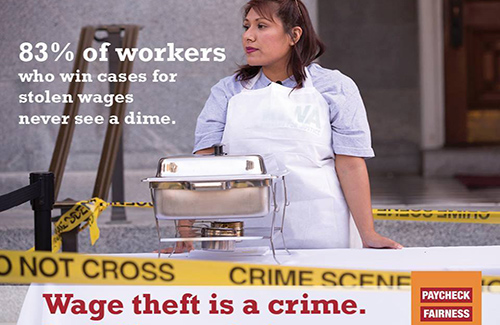
LOS ANGELES – It may not be the hottest topic on every activist’s to-do list, but the problem is as old as, well, the oldest profession. I’m talking about wage theft, and it happens to about 80 percent of the low-wage workers in Los Angeles.
Wage theft means that people work but don’t get the pay or the benefits they have earned. They could be paid less than the minimum wage. They could work overtime, but not get paid for it. They could be workers forced to work “off the clock” or not given their final paycheck. They could be tipped workers whose employer pockets the tips or they could be victims of payroll fraud – even forced to sign a statement saying they worked a 40-hour week when they worked much more, in order to get any check at all.
With 58 percent of its single parents working in poverty jobs and with 810,000 low-wage residents, Los Angeles has the highest poverty rate among major metropolitan areas in the country. That’s more people than in the entire city of Seattle. Some 40 percent of Latinos earn less than the minimum wage, and nearly 40,000 African American workers make less than a living wage.
To add insult to injury, these are the most likely candidates for wage theft as well. Eight out of Los Angeles’ 10 lowest-wage workers experience wage theft. That amounts to $26.2 million a week in lost pay. One billion dollars a year – money people do not have to feed their families, to see a doctor or to buy school clothes for their kids. It’s also wages that are untaxed, leaving the city with less revenue. It’s money that stays in the pockets of employers.
Well, you say, this is an enlightened country. There are laws against these kinds of abuses. And you would be correct. There are laws, but they are enforced by state agencies spread too thin and historically shorted of funds every time the legislature squeezes the budget. When workers feel cheated, if they are able to find a lawyer who will take their case, they can press charges. In most instances it takes two years to receive a decision, and in 83 percent of the cases, even though the workers win, they never see a dime. (Story continues after video.)
So worker advocates – including labor unions and Clergy and Laity United for Economic-Justice (CLUE) and the Coalition to End Wage Theft – are pushing for better protections on the local level. The campaign presents a solution that’s working in other cities such as San Francisco, New York, Chicago, Houston and Miami. The proposal has three prongs:
COLLECT – Create easy, simple and efficient tools for workers to collect the wages they have earned through placing liens on employer-owned property, withholding business permits until the employer pays, filing criminal charges against outlaw employers, increasing fines that make wage theft uneconomical and other remedies.
PROTECT – Add protections for workers who raise issues of wage theft to stop employers from retaliating, and certify visa applications when undocumented workers cooperate with wage theft investigations.
ENFORCE – Create a city bureau to handle wage theft claims and retaliation threats – one that levels the playing field between honest employers and irresponsible ones. The bureau could be financed by fines on wage theft violators.
This proposal means that in-home care givers, housekeepers, construction laborers, garment workers, car wash workers, dishwashers, janitors and delivery truck drivers, among others, would finally have some protection and accessible remedies to a problem that remains widespread and out of control.
Yes, this is an old problem. Yes, it is so old that we could think of it as part of the human condition, as old as greed itself. But that does not mean we should ignore it. Sacred texts as old as the Torah declare, “You shall not withhold the wages of the poor and needy laborers,” whether these are people like you or “aliens who reside in your land in one of your towns.”
The prophets spoke as well: “Woe to him who…makes his neighbors work for nothing, and does not give them their wages.” Even several hundred years later, a leader of the newly minted Christian church declaimed, “Listen! The wages of the laborers who mowed your field, which you kept back by fraud, cry out….”
Now those voices from the past mix with the voices of today’s workers, and together they rise to the ears of L.A.’s elected officials. Our work is to make sure our representatives act.
Rev. Jim Conn is the founding minister of the Church in Ocean Park and served on the Santa Monica City Council and as that city’s mayor. He helped found Clergy and Laity United for Economic Justice, Los Angeles, and was its second chair, and was a founder of Santa Monica’s renter’s rights campaign.
Reprinted by permission of the author and Capital and Main.
Photo: Los Angeles Coalition Against Wage Theft Facebook page

MOST POPULAR TODAY


Zionist organizations leading campaign to stop ceasefire resolutions in D.C. area

Communist Karol Cariola elected president of Chile’s legislature

Afghanistan’s socialist years: The promising future killed off by U.S. imperialism

High Court essentially bans demonstrations, freedom of assembly in Deep South






Comments